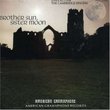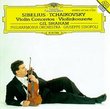| All Artists: Ferdinand Ries, Howard Griffiths, Zurich Chamber Orchestra Title: Ferdinand Ries: Complete Symphonies [Box Set] Members Wishing: 1 Total Copies: 0 Label: Cpo Records Original Release Date: 1/1/2006 Re-Release Date: 11/21/2006 Album Type: Box set Genre: Classical Style: Symphonies Number of Discs: 4 SwapaCD Credits: 4 UPC: 761203721627 |
Search - Ferdinand Ries, Howard Griffiths, Zurich Chamber Orchestra :: Ferdinand Ries: Complete Symphonies [Box Set]
![Ferdinand Ries: Complete Symphonies [Box Set]](https://nationalbookswap.com/cd//l/66/5166/6145166.jpg) | Ferdinand Ries, Howard Griffiths, Zurich Chamber Orchestra Ferdinand Ries: Complete Symphonies [Box Set] Genre: Classical
|
Larger Image |
CD DetailsSimilarly Requested CDs
|
CD ReviewsA Follower of Beethoven Who Found His Own Voice J Scott Morrison | Middlebury VT, USA | 01/13/2007 (5 out of 5 stars) "After having been released as four separate CDs, the eight symphonies of Ferdinand Ries are now available in a box at a considerable price break -- roughly the cost of two of the single CD issues -- and with all four of the very well written booklets that originally came with the single CDs. This is not only a bargain, it's an example of superior presentation, not to speak of superior performances. The first six symphonies are in plain stereo -- and with excellent sound; the 7th and 8th are in SACD and in spectacular sound. I had previously reviewed the final issue, of the 7th and 8th symphonies, and what follows is a couple of paragraphs from that review: "Ferdinand Ries (1784-1837) was a younger contemporary and, some say, acolyte of Beethoven. His music could easily be seen, on superficial examination, to be epigonal, but indeed these two symphonies show us that his music does indeed differ from that of Beethoven's if only in his rather more imaginative orchestration and idiosyncratic turns of phrase and harmony. Of course his music partakes of the same musical world as Beethoven's; still, here he sounds a bit like Schubert, there like Mendelssohn and even occasionally like Schumann, but ultimately only like himself. I will not state that he is as great as Beethoven - who is? - but his music does not deserve to languish in obscurity either; these works certainly deserve as much attention as, say, the symphonies of Niels Gade or Franz Berwald, to name only two formerly poorly known composers. Howard Griffiths and his Zürcher Kammerorchester have, with this CD, done an inestimable service by recording all of Ries's known symphonies. These two were never published in Ries's lifetime; in fact, the Seventh Symphony may be receiving its world premiere here. A word about the provenance of the two symphonies. Ries wrote six published symphonies and then there were two that went unpublished. He generally didn't number his symphonies until they had been published, but uncharacteristically he gave a number to the Seventh, written in 1837, even though it was never accepted by a publisher; it is his last symphony. The E flat symphony, called here No. 8, was performed a number of times but never published. It was probably written in 1822; cpo have seen fit to call it the No. 8, although more correctly it is simply 'Symphony in E flat, WoO 30.' (I would refer you to previous reviews here at Amazon - written by a reviewer simply calling himself 'A Music Fan from Lawrenceville, Georgia' - of the recordings of Symphonies 3 & 5, and Symphonies 4 & 6 by the same performers. They contain a wealth of information and informed opinion.)" Suffice it to say that the six symphonies that precede the final two are given similarly excellent performances. They all sound a bit like Beethoven and indeed there are times when one feels Ries was actually copying Beethoven -- for instance, the funeral march of Symphony No. 1 could be the younger brother of Beethoven's great 'Eroica' marcia funebre -- but overall, and with growing familiarity from continued listening, one comes to understand that Ries has his own voice. He may not be as original as Beethoven but he certainly deserves to be heard, just as his contemporaries Gade and Berwald do. Recommended. Scott Morrison" Ries Complete Symphonies Jean L. Van Meerbeke | Miami, Fl. United States | 11/30/2008 (5 out of 5 stars) "Beautiful album and extremely pleasant, to me unknown, symphonies.
I warmly advise lovers of the Romantic Period to buy this set Jean Louis van Meerbeke Bogotá Colombia" |

 Track Listings (8) - Disc #1
Track Listings (8) - Disc #1




![Across The Universe [Deluxe Edition]](https://nationalbookswap.com/cd//m/51/1251/1241251.jpg)



